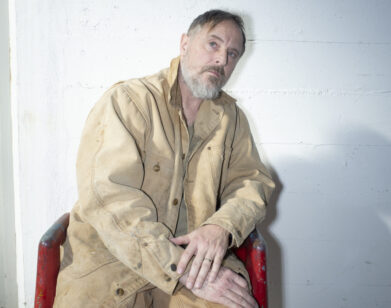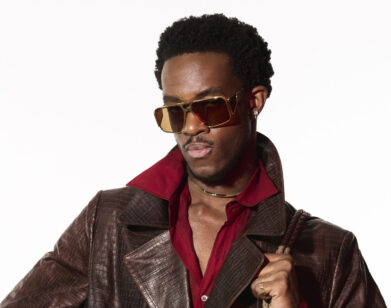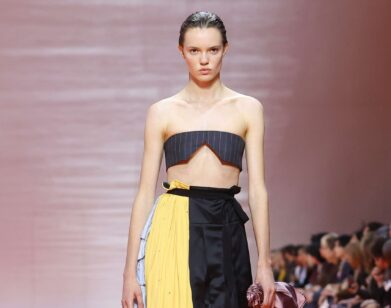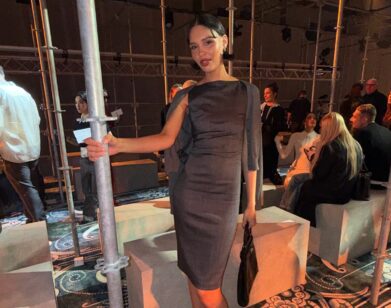LOOK
Mrs. Prada & Raf Simons on AI, Appropriation, and the Relevance of Fashion
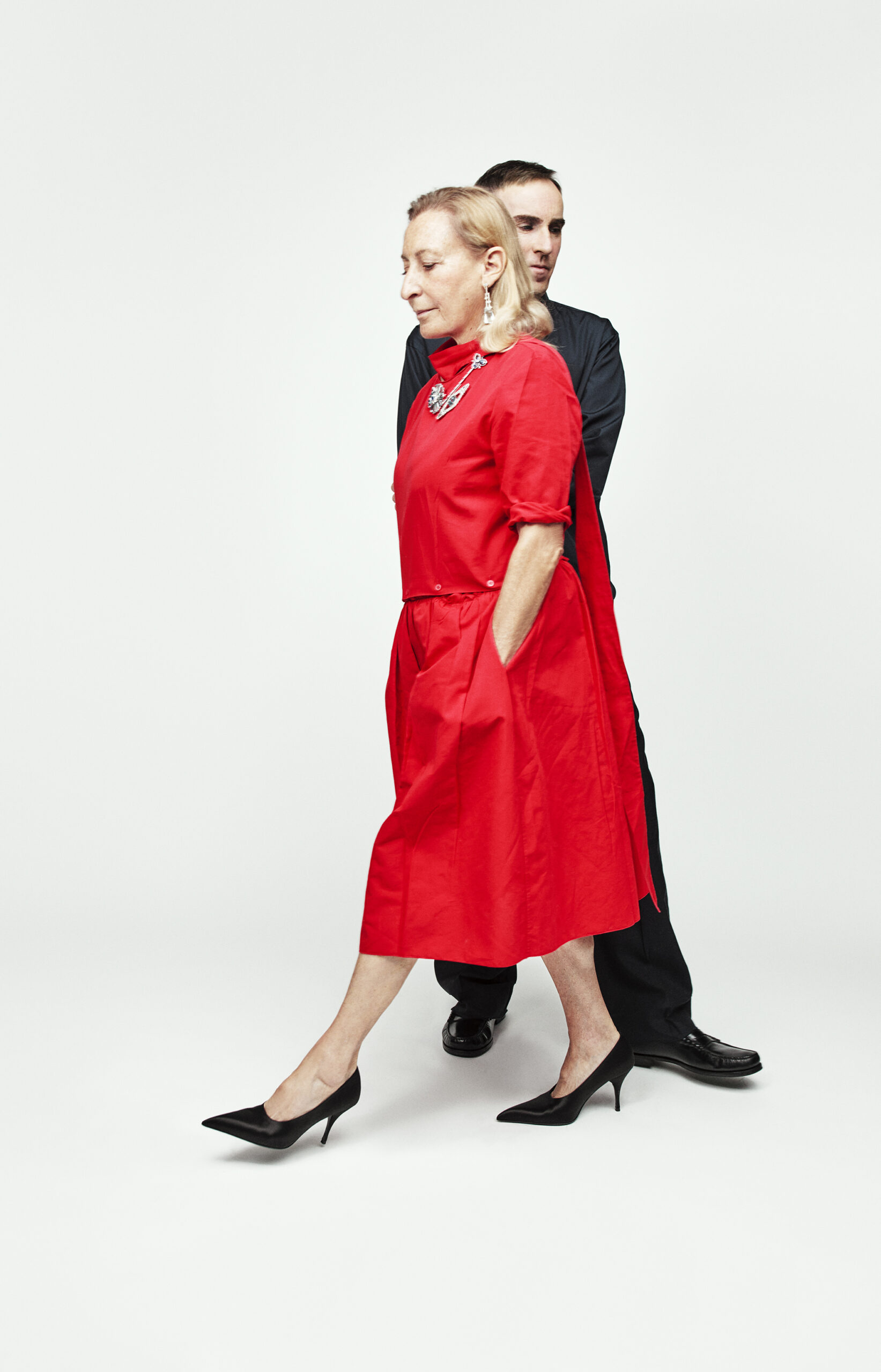
Miuccia Prada and Raf Simons wear Clothing, Shoes, and Accessories Mrs. Prada and Raf’s Own.
At 2:30 p.m. on a June afternoon in Milan, exactly 48 hours after the SS26 Prada menswear show, Miuccia Prada walks into her office. She’s wearing a brown silk dress of her own design, fitted and to the knee, with box pleats running down the body and a crewneck collar that looks to be made from shirting. She is soon followed by Raf Simons, co–creative director of Prada, in a tailored shirt and navy tailored knee-length shorts. Mrs. Prada pours a hot water from the drinks trolley; Simons gets himself a bottle of Coca-Cola. The two sit next to each other on one side of a table. Mrs. Prada gets out a piece of paper and a pencil and begins to write her own questions for the interview: “Relevance of fashion”; “Relevance of designers”; “Who is relevant in companies?”; “Questioning own life.” And so begins 1 hour 37 minutes and 33 seconds of conversation, much of which is fabulously off the record, if only you could hear it. About halfway through, Simons says,“Time for cookies,” and brings two plates, one of biscuits and one of chocolates, from the drinks trolley to the table. Behind us is the head of the slide by Carsten Höller, installed in her office in 2000, which leads three stories to the ground outside. This afternoon, no one goes down it.
———
TUESDAY 2:30 PM JUNE 24, 2025 MILAN
CHARLIE PORTER: So you know this is for Interview?
MIUCCIA PRADA: Yes.
PORTER: So the interviewer is—
RAF SIMONS: I thought it was just us.
PRADA: I probably told him 10 times. [Laughs]
SIMONS: No, no, no.
SPEAKER 1: Charlie’s the facilitator and the witness.
PRADA: So we should talk about the relevance of fashion…
SIMONS: You mean in our company, or—
PORTER: I’m into it all.
SIMONS: The relevance of fashion, I question it my whole life. Because back in the day, I was finding it very complicated. I thought, “Why am I doing fashion when you could do so many more important things?” It was only until somebody said to me, “You have no idea what it means to people.” And that’s true. In complicated moments you question it even more.
PRADA: I think that fashion is for when you’re happy, when you don’t have problems, because the moment somebody has a problem of health or war, fashion is definitely not relevant.
PORTER: Mm-hmm.
PRADA: It’s part of the aesthetic of life. You choose a home, you choose furniture, you choose a place to go on vacation, you choose how to dress. For instance, if I see an architect who has a bad home, I don’t think he’s a good architect. There must be a coherence. If you have a vision of the world, even an ideological vision, it’s reflected in your aesthetic choices.
SIMONS: Well, war is the exception to what I say. I do agree very much with you.
PRADA: So talking about the relevance of fashion, it depends on the moment.
SIMONS: Yes. I had my mom in the hospital for almost four months and I couldn’t care less about fashion. But then my mom, she did care a lot. She wanted to still feel good and she would ask me to put lipstick on her. So it is important at the end, for all of us.
PRADA: It’s true. At this moment, useless stuff is really useless. Meaningful ideas are welcome, but ideas just for the sake of doing something new doesn’t interest me. The show we did two days ago was really about that. But also it depends who it’s for, because the world is so big—different countries, different religions, different problems.
SIMONS: Yeah, everything is so open, so everything is also communicated in a different way, and there’s a bigger audience than there used to be. It’s very, very difficult to do things that are for everybody.
PRADA: Yes, but on the contrary, more and more people seem attracted to fashion.
SIMONS: But in general, I think the big audience that we have now, compared to the audience we had in the ’90s, is mainly attracted by the phenomenon of fashion more than the actual clothes.
PRADA: As an example, in the ’60s, the miniskirt was a reflection of the women’s revolution, and in the ’70s, everybody thought to go to the moon and fashion turned quite futuristic and plastic and so on.
SIMONS: But that’s also—
PRADA: Because there was a change in society.
SIMONS: Exactly. Now, nobody knows what the future is. Actually, there is a fear about the future. And then also a numbness. It freezes you. Every day you open your phone and you read another article, either about politics or war, or another attack.
PRADA: The only thing that I find correct and decent is intellectual honesty. We are a company that has to sell clothes, so we make things that make sense to people, as creatively as we can. But it’s not a moment that is good for creativity. It’s an important moment for other fields, science for instance.
PORTER: And A.I.
SIMONS: Unbelievable. Suddenly there was all this stuff on Instagram after the show. [Simons opens Instagram and pulls up some A.I.-generated clips from the menswear show, including a video of Simons giving Mrs. Prada a piggyback ride].
PRADA: How do they do it?
SIMONS: I don’t know.
PRADA: Except for our faces, we look completely real.
SIMONS: They did it so quickly also. It’s kind of unbelievable. It’s one person who does it.
PRADA: We should hire him.
SIMONS: Exactly. Where were we?
PORTER: I was interested in the use of the word “human” after the show, and I wondered whether you could talk about the word human, particularly in relation to A.I.
SIMONS: For us, there is a strong desire to design clothes that are real. And by real, we mean it’s for humans. They’re able to wear it. It might be defined as commercial, but that’s not how we see it. This is something we talked really deeply about when we started working together. We really wanted to embrace this idea of the real, because we both have a reputation for doing eccentric shows, but we both don’t feel like serving the small audience that embraces them, because it’s not what the fashion audience is anymore. For me as a designer, the most pleasing thing is if I see people wearing it—that’s more important than people adoring your show because it’s a spectacle.
PORTER: I was also thinking about the relationship with functionality, meaning functionality of the body, functionality of the mind. Actually being able to function as a human being.
PRADA: I think about functionality for the mind. I never think about the relationship between a piece of clothing and the body. If I like something that is totally unappealing on me, I wear it anyway. For me it’s always been about thinking. Physical functionality, I was never interested in that. At one point, I said I was completely against comfort. Comfort is not a moral or something to reach. Comfort is sloppy.
SIMONS: I think it’s quite a recent thing in the last five, six, seven years, comfort being the new luxury. That’s not how we think.
PRADA: I want something to be interesting, something to be challenging, and that’s not comfort, I find.
SIMONS: I can see something in another designer’s show and I’m blown away. But then there’s the question, are people going to wear it? For me, fashion has to go in the street, it has to be on humans. It’s not an art form.
PRADA: This we completely agree on. And some of the more artistic shows aren’t politically correct. You can say being politically correct made things more banal, but you don’t want to offend anybody. I completely understand, but—
SIMONS: It takes a very important thing away from fashion designers, and that’s spontaneity. Every move you make, you have to think twice.
PRADA: That’s why the creativity is not there. It’s good to think this way, but from a creative point of view it’s not helpful. I remember in the ’90s, we could do whatever we wanted. This is an effect of globalization. You have to consider not just a small group of fashion people, you have to consider everyone. But I never think, “Ah, let’s do something to please somebody.” I do what I think is good and relevant, and he does the same. I realize that one of the reasons Prada is doing well at the moment is because people trust us. They realize that we are serious. It’s not about performing culture, it’s about intellectual honesty.
PORTER: Prada is doing really well but it’s still super specific.
PRADA: We are still niche in the world because of the price of our stuff—niche in China, niche in Italy, niche in Japan, niche in Saudi Arabia, niche in America. But for sure, it’s privileged people.
SIMONS: Yeah. That will never change.
PRADA: So, when they talk about democracy and fashion, what does it mean? And what is interesting is that very few people talk with an understanding of fashion. It’s always considered superficial.
PORTER: Do you think it’s a fear of fashion?
SIMONS: I don’t think people are scared of fashion anymore. They used to be; now it’s the opposite. One thing I find strange with the new world is how it forbids so many things. It’s very criticized when you make a wrong move—for example, appropriation. But if you see what the world allows politicians—I’m like, where is this going? I think fashion has always been really, really obsessed with the future. But if I look at the world now, people have such a desire to go back to old values, old systems, to very incorrect human things. It’s awful.
PRADA: Yes.
SIMONS: Fashion often has an interest in the past, but for a different reason.
PRADA: The past is crucial. It’s what defines us. It is where we learn from, and it teaches us not to make the same mistakes.
SIMONS: Absolutely. But fashion always wants to be future-oriented. I think every fashion designer thinks, “I’m going to make something better or more beautiful than before.”
PORTER: And beauty standards are changing, particularly around gender.
SIMONS: Naturally. That’s my whole point. Just when you think there is evolution, it gets pulled back again. Clearly, many people don’t want it.
PORTER: I see the shorts from yesterday’s show as pushing against that; they are an anti-patriarchal garment.
PRADA: Definitely. We tried to provoke thoughts.
SIMONS: We both like uniforms. We think they’re beautiful garments. But we don’t like the connotation with war or male dominance, so we turned it around.
PORTER: And then also in the women’s show for Fall/Winter, the dresses are doing everything to be not dresses, to break the idea of a dress.
PRADA: Changing the perception of beauty, that’s something I always try to do my whole career, together with the vision of taste. But fashion is still very often linked to a very conservative idea of beauty. So that’s why sometimes we mention the ’50s and the ’60s as symbols. Because they represent a different way of thinking and being in different periods in history.
SIMONS: Designers and brands are the ones who oppose and create and make clothes, but way before I became a designer, I had an opinion on how I wanted to look. It was not necessarily “It needs to be that designer or that brand because I’m obsessed.” I had my own vision, and I wonder if the audience is like that today. I don’t really feel it so much in the street anymore.
PORTER: Do you think it’s also because, when we were growing up, fashion was the main way you communicated? Whereas now, you communicate on the internet?
SIMONS: Maybe. Technology, I think, results in less and less individualism. When you’re 12, 13, 14, everybody sees you. Everybody knows you. We lived in a small world compared to these kids. We had a different mindset. I was a New Waver in high school, for example, and there were maybe two others. So I was completely different than all the rest. And this was exactly what I wanted. Right now, people get so much critique if they are different from others, so they want to be the same. Whereas we wanted to be black sheep. I would hate it if somebody in my class would wear the same thing as me. I couldn’t even stand if they would wear the same genre.
PRADA: Of course, me the same.
SIMONS: Now the kids want to wear all the things that their friends have.
PRADA: Because they’re exposed to comments, so of course they’re afraid. It’s just like the red carpet, the Oscar clothes. They’re afraid that they won’t please everybody, so they go for the safe choice.
SIMONS: The red carpets. There’s so much wrong. But we have to keep believing in it, of course.
PRADA: Let’s say something positive. [Laughs]
SIMONS: Time for cookies and chocolates. [The trio takes a short break]
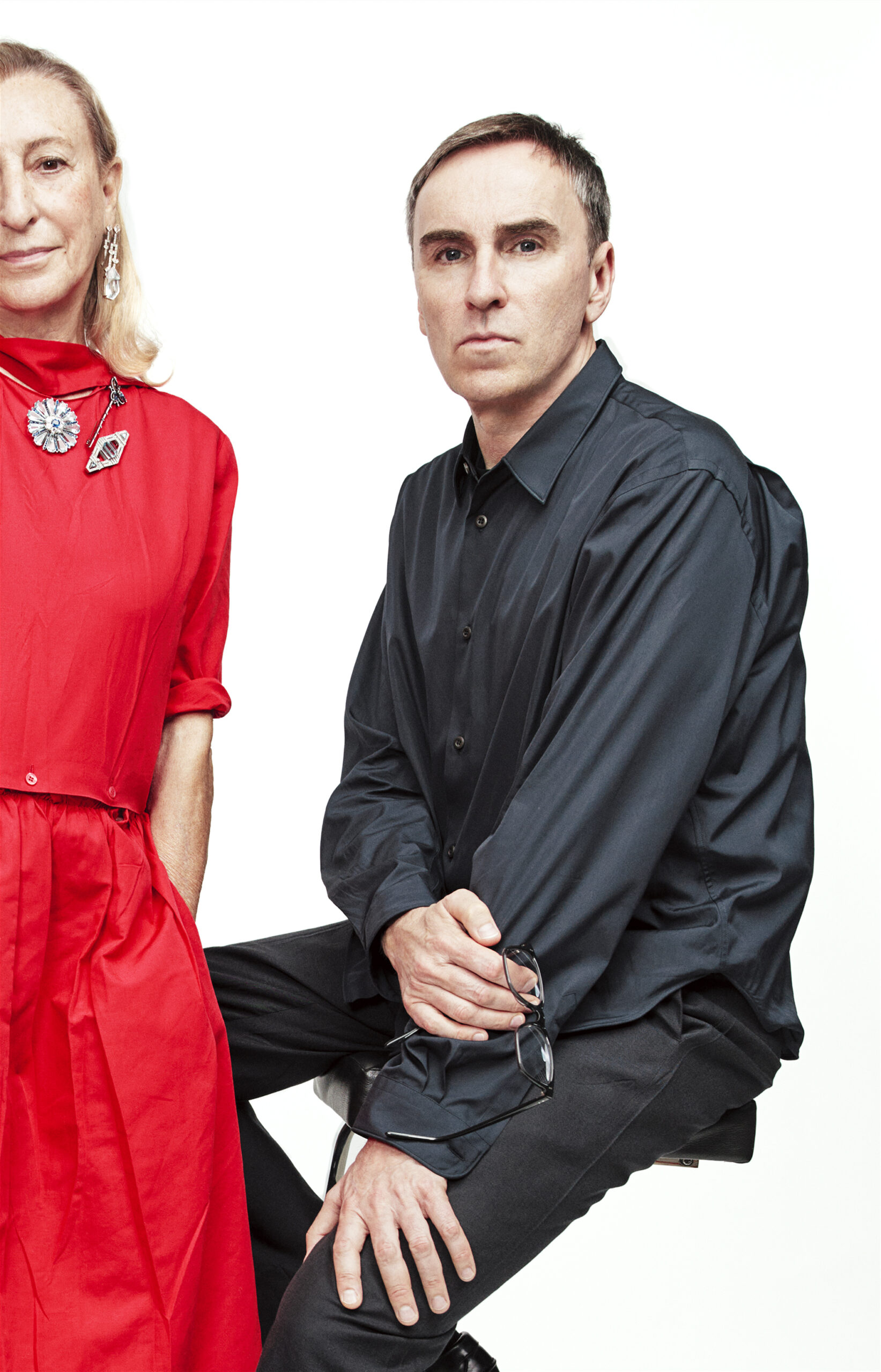
PORTER: Can you talk about tension?
PRADA: Of course. It’s everything. It’s what drives you.
SIMONS: What do you mean, exactly?
PORTER: To me, tension is actually what fashion is. In physical terms, tension holds the seams together. But also, tension within the idea, the styling, whether things go together or they don’t.
PRADA: I thought tension in the sense of what drives your life.
PORTER: That as well.
SIMONS: It’s for sure all drive. But it’s very difficult to put it in words and sentences. It’s just something you feel, and then you can only hope that that’s also how other people feel when they see it. But in fashion, I don’t really feel so much tension.
PRADA: Yes, but we don’t have to go into nostalgia.
SIMONS: No, we don’t want to say the past was better. I hate nostalgia. What I find interesting now is to judge things over a longer time period and not necessarily collection by collection. We’ve both been in it a long time, Miuccia much longer, but me over 30 years. You look at it in a different way. We want to be fast with our reactions, and sometimes we’re too fast. Everything has sped up and our attention spans are much shorter, which is something I disagree with. People don’t even listen. Journalists, they should understand. I said this was the easiest show prep for me—everything came together in four, five days before the show, but people interpreted that statement as it being the easiest collection we ever did, which is a very different thing. If you have a collection which is more doable in terms of form—it wasn’t like a big shoulder and a narrow waist and strange lengths—you could think, “Ah, it looks so easy,” because you didn’t really pay attention to it. Whereas it actually wasn’t so easy to get it to that point. We knew where we wanted to go in the beginning, but it’s still always quite a struggle to get there.
PRADA: We changed the music two days before the show. We can change things drastically because you might learn something—and then maybe you adjust everything else.
PORTER: I loved it.
SIMONS: Thank you. I felt very good after the show. Sometimes I feel, for a day or two, very strange after the show. This time was completely different.
PRADA: It’s very important to put in lots of effort during this difficult moment. Okay, this is pretentious, but people that have culture, that live in ideas, they should do the best they can. Otherwise, why do we live? The more difficult the time, the more work and studying and complex thinking is required.
SIMONS: Don’t you think that everybody thinks that?
PRADA: Of course, people try to do their best, and the more difficult or challenging the time, the more passion and drive people have.
SIMONS: I find that drive for me never changed, and for you either. I just find it way more difficult to read in advance of the reactions if it’s the right thing or not. I know if it’s the right thing for us—
PRADA: But that’s the only thing you can be sure about, your point of view. You have to enrich your mind enough and hope that you are in tune with people.
SIMONS: But it also comes back to the fact that we don’t always agree with everything. You have to decide if you want to please everybody or not. It’s also a decision when you have a brand.
PRADA: Everybody always asks, “Why are you growing?” Since the beginning, I wanted to grow because I thought it was much more interesting to serve a big group of people than the few chic ones. Now, if you’re not big, you have a problem. Nowadays in fashion, you are judged by how much money you make.
SIMONS: That’s terrible.
PRADA: So then you say, “Okay, now I have to make money, otherwise people think that our work is not good.” [Laughs]
SIMONS: I never felt it in my brand.
PRADA: A company has to grow because if you are not growing, you lose tension. It’s a natural evolution of a company.
SIMONS: It’s an economic law.
PRADA: Yes. But also not only economics. Sometimes people ask me, “Why do you need to grow?” I am a designer, but I created this company with my husband, so I am also an entrepreneur. It comes natural that you want to do better. After you build a beautiful shop, you say,“Ah, why don’t we open another?” It’s the idea of evolution. For some people it’s about making more money, but for us it’s not. It’s about evolving. The company is a living animal.
PORTER: Okay, we’ve only got a few minutes—can you tell me how you feel between now and the women’s show on September 25?
SIMONS: Honestly, it’s a special moment. There are so many designer switches and hires that you are aware that, the September shows, it’s going to be a bit of thunder and lightning. You just have to do your thing, and that’s what we do. It’s not that we are not talking about it; we are aware of what’s to come.
PRADA: What I want to do is really push more what we started saying in the men’s collection. I feel a real twist in fashion.
SIMONS: Watch out because this is coming out before the show and then we’re going to disappoint them. [Laughs] We feel challenged, basically, is the answer. Not so much because of the changes everywhere, more because of the world’s condition. On top of that, the fashion world is shaking, and that makes you think also. We are a brand that has been operating for many years under the leadership of Miuccia, but we have been running it together for five and a half years already, and you know how the audience is. They’re getting all these new things, which is very exciting, so we also have to make sure we’re extra exciting as well.
PRADA: To be exciting in a modest way is more difficult. [Laughs]
SIMONS: Yeah. I think there will be a lot of fighting for attention. It is especially interesting for me in the context of the economic situation, to watch in which way the new talents are in dialogue with management, owners, and CEOs. Is there tension or not? Is it pre organized and preset out?
PRADA: That is a common discussion: who is relevant in fashion, who is in charge. Also, young people don’t have the patience to create their own brands. Me, together with many other brands that became important, we started small. You too.
SIMONS: From nothing.
PRADA: And you grow. If you want fame, money, then it follows.
SIMONS: In the first decade, I didn’t find it tough.
PRADA: Me neither.
SIMONS: Now it’s a tougher environment.
PRADA: Now, you have a sense of responsibility. Your work depends also on the work of many people.
SIMONS: After college I went into industrial design. We had to present our projects in front of the class, and it stressed me out. I swore to myself I wouldn’t have to do that the rest of my life, but actually we do. Each time you finish the project, it’s again judgment day.
PRADA: We do a show, we are judged.
SIMONS: I wish I could say I don’t care, but I do care.
PRADA: I care. I care exactly like the first time.
SIMONS: I sometimes hear designers say,“I don’t care about what they write.” I’m like,“Wow, you’re so strong.” Me, I go online the day after.
PRADA: For three days I am in a bad mood after a bad review. [Laughs]
SIMONS: This is day three, by the way. You are pretty good right now. [Laughs]
SPEAKER 1: We’re out of time.
PORTER: Thank you both.
PRADA: Thank you so much.
SIMONS: Thank you for your questions.
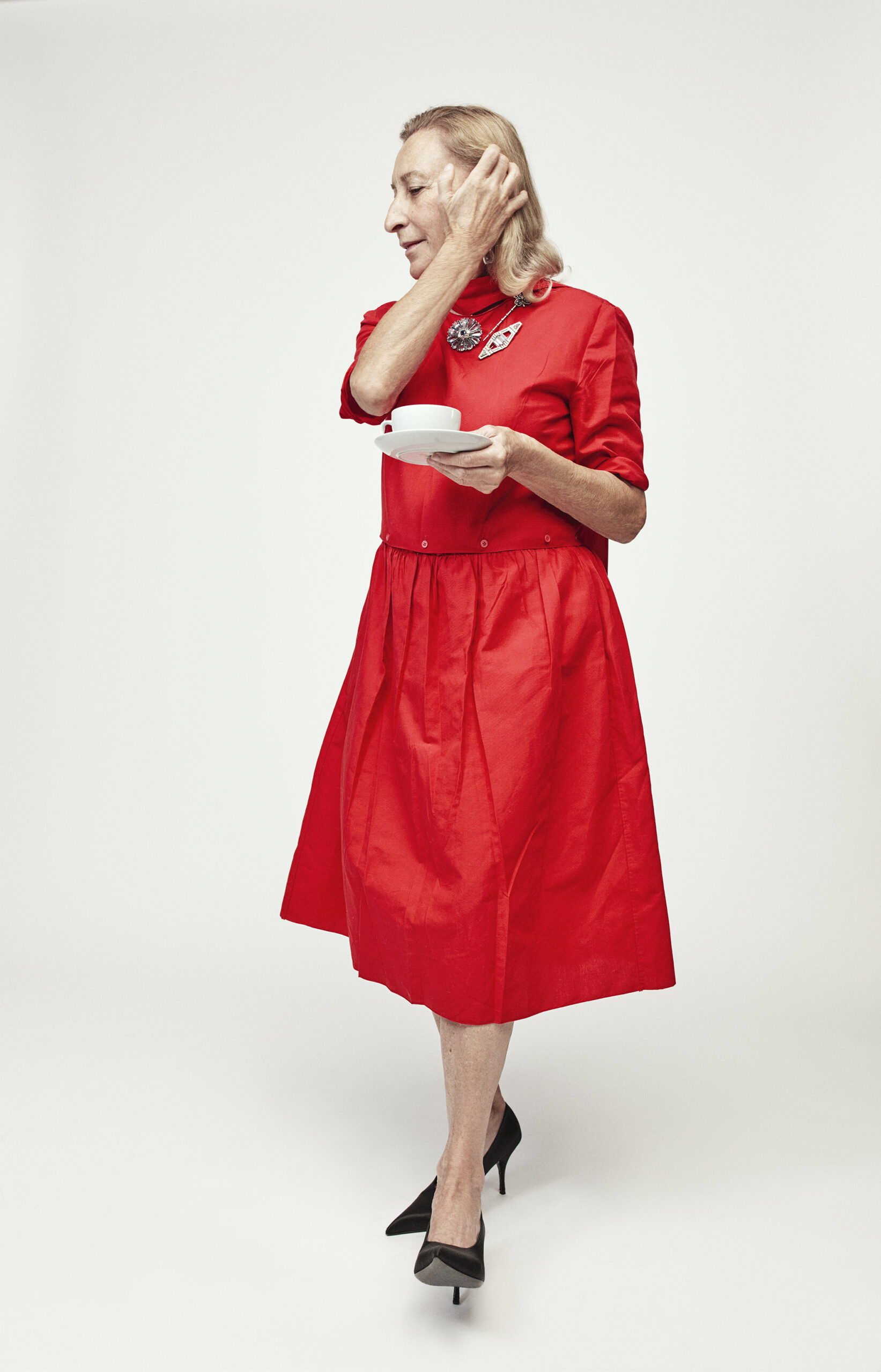
———
Lighting Technician: Romain Dubus.
Photography Assistants: Mirco Tea and Marta Gabriele at Circus.
Digital Technician: Henri Coutant.
Post-production: Stéphane Virlogeux.

